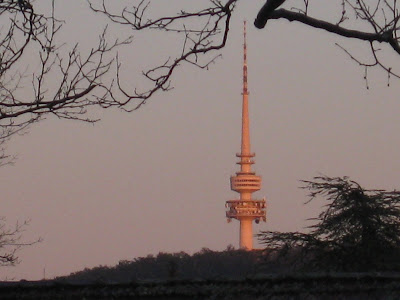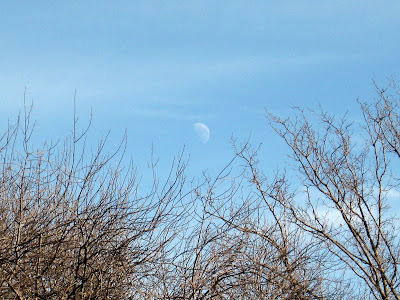 |
| A welcome sign: A beautiful crescent moon smiles down upon relieved fasters. |
In previous years I had always gone to the mosque with Hebbat to mark the end of the 30 day Ramadan ordeal, but this year we were in different cities. I knew things would be different but I didn't want to let such a hard-earned occasion go by unmarked. Without having any connection to the muslim community in Canberra I didn't feel quite up to gate-crashing the mosque, so somewhat in desperation, I decided to attend the morning prayer at the local anglican church.
Considering the fuss that was probably ensuing at the Canberra mosque on the biggest day on the Muslim calendar, the turnout at the church was slightly disappointing. Not counting myself, there was a grand total of three people, two of whom were ministers of the parish. Still, I wasn't to complain - Ramadan was meant to have taught me gratitude! Besides, the prayers they said were nice and although they didn't pray for muslims celebrating Eid, they did prey for people without the means to feed themselves and I thought that was rather appropriate.
After putting a small donation in the church collection box (specifically in the hope of feeding those hungry people we had prayed for), I contemplated the possibilities of my newfound sustainitary freedom. Would it be a picnic lunch down by the lake, or a hearty meal at a hilltop restaurant? Unfortunately any hopes of a daylight feast were soon dashed by complications involving my mother and grandmother. Rather than fine-dining and celebrations, the rest of my day was spent ferrying people between aged care centres, doctors surgeries and shopping malls.
It was early evening before I finished the final errand, and walking exhaustedly back to the car I began to feel rather glum. Had I just imagined the good feelings at the end of Ramadan's past? Certainly to endure 30 days of self-imposed hardship in near isolation from the muslim community now seemed a rather daft idea. Without people close-by to share feelings of relief and gratitude, it seemed all my lonely suffering could have been in vain.
Then, as if in response to those gloomy thoughts, a sign appeared. Looking to the west I spied a beautiful crescent moon floating delicately above the winter skeletons of trees. It was a majestic sight and incredibly, this tiny sliver of light seemed to turn my grim feelings upside down. I began to text Hebbat in earnest, wondering if she might be able to see the same thing, but as I was typing my phone began to vibrate with an incoming message. She had seen it too!
Despite our geographic separation we had witnessed the same moon at almost the same time. And I was sure Hebbat and I wouldn't be alone. The new crescent moon was acting like a giant billboard of planetary scale, synchronising the celebrations of thousands of muslims on the east coast of Australia wherever there was a clear patch of sky to make it visible. You didn't need a telescope, a science degree or even an expensive ticket to see it, it was there for everyone - giant, luminous and democratic.
I was enamoured with the idea that rather than being synchronised by a rock concert, an election annoucement or even the series final of Master Chef, here was a group of people following the beat of something larger. Now I'm just as unbelieving as the next post-modern white australian, but it was a comforting thought that for once, instead of just obeying other people, we were taking our instructions directly from above.
I continued walking with a swing in my step. My feet were firmly on the ground but my gaze was skyward and my thoughts wandered to what the next 11 lunar cycles might hold for me.
Sure, it hadn't been the Eid that I'd imagined, but I really couldn't have hoped for a better ending.
Until 1432...
Amen (Amin).
























